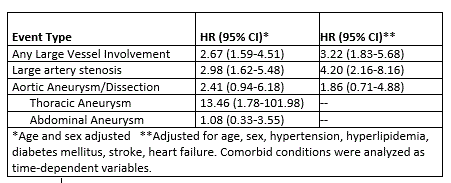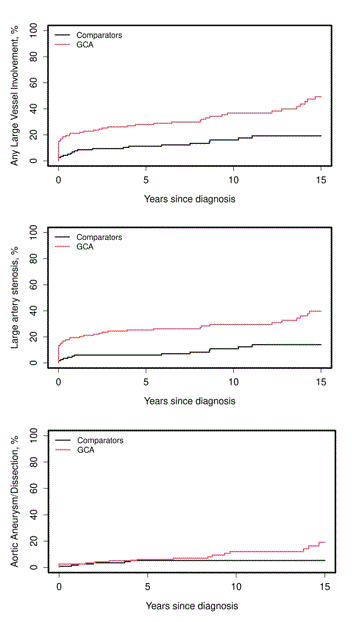Session Information
Date: Tuesday, November 14, 2023
Title: (2387–2424) Vasculitis – Non-ANCA-Associated & Related Disorders Poster III
Session Type: Poster Session C
Session Time: 9:00AM-11:00AM
Background/Purpose: Large vessel (LV) complications are known to occur in patients with giant cell arteritis (GCA). The magnitude of risk compared to the general population remains unclear.
In this study, we aimed to estimate the incidence of LV manifestations in a population-based cohort of patients with GCA compared with a non-GCA cohort from the same population.
Methods: The patient cohort included cases with incident GCA between 2000-2016 in defined geographical area. Incident LV complications were defined as aortic aneurysm, aortic dissection, stenosis in the aorta or any of its main branches diagnosed within 1 year prior to the diagnosis of GCA or anytime afterwards. A comparator cohort (age- and sex- matched) of individuals without GCA was assembled from the same population. Each subject was given an index date corresponding to an incidence date in the GCA cohort. All subjects were followed through December 31st, 2020, death, or migration. Cumulative incidence of large artery complications was adjusted for the competing risk of death. Cox proportional hazards models were used to assess the association of clinical characteristics with large artery complications.
Results: The patient cohort included 119 cases with GCA. Majority were female (88, 74%); mean age at diagnosis was 77.7 ± 8.1 years. Mean follow up for GCA cohort was 8.9 ± 4.7 years and 7.7 ± 4.9 years for the comparator cohort. LV complications occurred in 49 patients in the GCA cohort Vs 20 in non-GCA (HR: 2.67, 95% CI: 1.59-4.51). Large artery stenosis occurred in 40 patients in GCA cohort vs. 14 in non-GCA (HR: 2.98, 95% CI: 1.62-5.48). This included subclavian artery stenosis (17/40 GCA vs 1/14 non-GCA), axillary artery stenosis (9/40 GCA vs 0 non-GCA), vertebral artery stenosis (13/40 GCA Vs 3/14 non-GCA) and carotid artery stenosis (6/40 GCA Vs 4/14 non GCA).
On the other hand, aortic aneurysm/dissection occurred in 16 patients in the GCA cohort vs. 6 in non-GCA (HR: 2.41, 95% CI: 0.94-6.18). Furthermore, GCA was found to be a significant risk factor for the development of thoracic aortic aneurysm (HR: 13.46, 95% CI:1.78-101.98) but not for abdominal aortic aneurysm (HR: 1.08, 95% CI: 0.33-3.55) (Table 1). This elevated risk for any LV complication, large-artery stenosis and aneurysms persisted even when adjusted for age, sex, and comorbid conditions (Table 1). Interestingly, the incidence rates of any LV complication at 5 and 15 years were 27.8% (95% CI: 20.8-37.2%) and 49.2% (95% CI: 39.3-61.7%) respectively for the GCA cohort compared to 11.2% (95% CI: 6.7-18.7%) and 19.2% (95% CI: 12.5-29.4%) in the comparator cohort (Figure 1). Among individuals who developed LV complications, presence of GCA was not a significant predictor for death (HR: 0.82, 95% CI: 0.41-1.61).
Conclusion: In this study, large-artery stenosis and thoracic but not abdominal aortic complications were higher in patients with GCA. The pattern of involvement of large-artery and aortic manifestations differed in patients with GCA. Compared to the general population, the incidence of LV complications in patients with GCA increased over time which has implications for the long-term follow-up. GCA did not significantly increase risk of death in subjects with LV complications.
To cite this abstract in AMA style:
Elfishawi M, Kaymakci M, Achenbach S, Crowson C, Kermani T, Weyand C, Koster M, Warrington K. Risk of Large Vessel Complications in Patients with Giant Cell Arteritis, a Population-based Study [abstract]. Arthritis Rheumatol. 2023; 75 (suppl 9). https://acrabstracts.org/abstract/risk-of-large-vessel-complications-in-patients-with-giant-cell-arteritis-a-population-based-study/. Accessed .« Back to ACR Convergence 2023
ACR Meeting Abstracts - https://acrabstracts.org/abstract/risk-of-large-vessel-complications-in-patients-with-giant-cell-arteritis-a-population-based-study/


